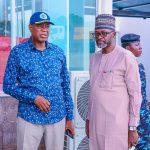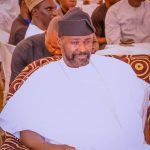A Mandate of Trust: Tinubu’s Leadership Reaffirmed at APC Summit
By Bala Salihu Dawakin Kudu – Northern Bureau Chief, Democracy Newsline
May 29, 2025
The Banquet Hall of the Presidential Villa, Abuja, recently played host to a significant moment in Nigeria’s political history. The All Progressives Congress (APC) National Policy and Leadership Summit was convened not merely as a celebration of the administration’s achievements but as a strategic forum for reimagining Nigeria’s future. Aptly themed “Renewed Hope Agenda: The Journey So Far,” the summit became a defining platform for recalibration, deep introspection, and political alignment.
What stood out beyond the deliberations and reviews was the historic and unanimous endorsement of President Bola Ahmed Tinubu as the APC’s flag bearer for the 2027 general election—a political milestone that reaffirms trust in his leadership and signals a consolidated front within the ruling party.
An Assembly of National Gravitas
The summit brought together a distinguished coalition of Nigeria’s political leadership—President Bola Ahmed Tinubu, Vice President Kashim Shettima, Senate President Godswill Akpabio, House Speaker Rt. Hon. Tajuddeen Abbas, APC National Chairman Dr. Abdullahi Umar Ganduje, and all 36 APC state governors under the Progressive Governors’ Forum. Also present were serving and former ministers, National Assembly members, grassroots leaders, youth and women representatives, and high-ranking party executives.
The presence of such a wide spectrum of stakeholders reflected a broad consensus and underlined the significance of the event in shaping the trajectory of the Tinubu administration’s second year in office.
Ganduje’s Quiet Revolution
The APC National Chairman, Dr. Abdullahi Umar Ganduje, was widely credited for the strategic coherence and organizational excellence of the summit. His leadership has taken the APC beyond electoral rhetoric to policy articulation, reform orientation, and grassroots integration. Under his stewardship, the party has embarked on digitizing its membership—a major leap toward transparency and mass participation through the new National Digital Membership Register.
Ganduje’s vision has helped redefine the party from a vehicle of electoral victory to a platform for sustained governance reform and national cohesion.
Renewed Hope as Governance Doctrine
The summit reviewed the Tinubu administration’s achievements across key sectors:
Economic Management: Participants acknowledged early signs of macroeconomic stabilization following the removal of fuel subsidy and exchange rate unification. Despite public hardship, the administration’s reforms were described as tough but necessary steps toward long-term national economic sovereignty.
Social Investment: Initiatives like the Student Loan Scheme and Conditional Cash Transfers were spotlighted for reaching underserved communities and restoring hope among youth and vulnerable populations.
Infrastructure: Massive ongoing works on the Lagos-Calabar Coastal Highway, rail networks, and federal roadways showcased the administration’s commitment to physical transformation as a driver of economic revival.
Energy and Security: Efforts in gas infrastructure, solar deployment, and restructuring of the power grid were noted as foundational investments. Insecurity, especially in the North-East, has seen marginal improvements, aided by enhanced security asset deployment, welfare upgrades for personnel, and increased reliance on intelligence-led policing.
The Endorsement That Redefined 2027
In the most politically defining moment of the summit, Senate President Akpabio moved a motion, seconded by House Speaker Abbas, for President Tinubu’s endorsement as the APC’s candidate in the 2027 election. The motion received overwhelming support from all party wings, including governors, legislators, and party executives.
Governor Hope Uzodimma of Imo State, speaking on behalf of the Progressive Governors’ Forum, described the decision as a reaffirmation of the party’s confidence in Tinubu’s vision and the necessity for continuity in reform-driven governance.
This early endorsement is not merely a political maneuver—it is a calculated affirmation of policy continuity, leadership stability, and party discipline.
Tinubu’s Vision for Continuity
In his keynote address, President Tinubu declared the APC as Nigeria’s “most potent democratic force” and championed the Renewed Hope Agenda as more than a campaign slogan—it is becoming a “living philosophy of governance.”
He welcomed the wave of defections from opposition parties, especially the PDP, calling it a natural consequence of people “bailing out of a sinking ship.” His call for unity and openness to newcomers was both strategic and symbolic, positioning the APC as a national platform for all Nigerians regardless of background.
Tinubu also took ownership of the difficult reforms implemented since 2023, emphasizing that long-term national interest must always take precedence over short-term political gain. “We did not come to play it safe,” he declared. “We came to correct the fundamentals.”
What Lies Ahead
The summit’s tone was both celebratory and challenging. While progress has been made, key issues such as inflation, food security, and unemployment still require urgent and targeted policy responses. However, what sets the Tinubu administration apart is its willingness to confront these issues head-on.
More importantly, the summit set a template for performance-based politics—where leadership is judged not by platitudes but by measurable outcomes. It marked a shift in political culture: from personality to policy, from promises to delivery.
A Renewed Mandate of Trust
President Tinubu’s endorsement for 2027 is not only a vote of confidence but a mandate built on trust, performance, and the unrelenting desire for national progress. The APC has demonstrated internal unity, strategic foresight, and institutional maturity—a necessary trifecta for a country as complex and diverse as Nigeria.
As the administration marches into its third year, the Renewed Hope Agenda has matured from a campaign catchphrase into a bold doctrine of governance—built on sacrifice, transparency, and reform.
For Nigeria, this may well be the beginning of a political culture anchored on planning, inclusivity, and patriotic responsibility.
Garba is the Chief of Staff to the National Chairman of the APC.










